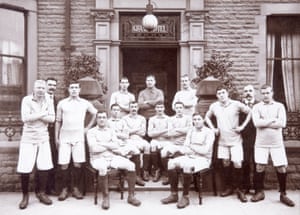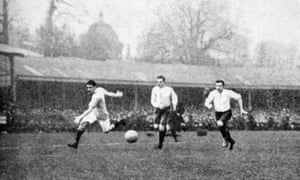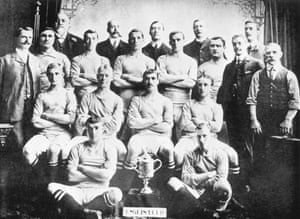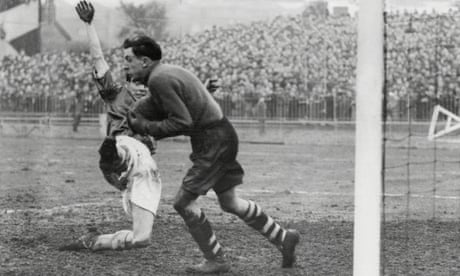Great piece in the Guardian on Man City's financial cheating over a century ago. They'll love this on the Fume.
The forgotten story of ... Manchester City flouting finance rules in 1906
A punch thrown in 1905 culminated in 17 City players and four directors being banned over the club’s illegal overspending
Simon Burnton
@Simon_Burnton
Wed 26 Feb 2020 12.20 GMTLast modified on Wed 26 Feb 2020 12.24 GMT

Manchester City in full kit outside the Grand hotel, circa April 1904. Billy Meredith is seated third right. Photograph: Popperfoto via Getty Images
In May 2019, with Manchester City facing several investigations including one by Uefa regarding the alleged breaching of financial fair play regulations, the Guardian reported remarks made by the club’s chairman, Khaldoon Mubarak. “With success there is a certain level of jealousy, envy, whatever you call it,” he said. Almost two weeks ago, when Uefa announced that its investigation had found City guilty, the club released a statement describing the process as “flawed”. “With the prejudicial process now over,” they said, “the club will pursue an impartial judgment as quickly as possible.”
In August 1905, after City’s Billy Meredith had been found guilty of bribery following a Football Association investigation, the Guardian reported remarks made by the forward. “League officials, he asserts, are jealous of the [club’s] growing success,” we wrote, “but he thought the whole country would demand such an unjust decision being reversed by the whole question being reopened at once.”
The whole question was indeed reopened, at which point a range of misdemeanours spilled out of the club, offences that appear so eerily familiar to those following their latest scandal it is as if some ribbon of DNA runs through the club. In 1906 they were found, in essence, to be funnelling money through secret accounts to circumvent rules designed to stop wealthy individuals from pouring their money into clubs, skewing the market and gaining an unfair sporting advantage.
City hid their misdemeanours well, and in 1906 there were no Portuguese computer hackers to uncover them. In all likelihood they would have remained undiscovered had a player called Sandy Turnbull not one day thrown a punch.
The 1904-05 season was coming to a breathless conclusion, with City, Everton and Newcastle fighting for the title in the final fortnight. Fighting was the appropriate word, with two of City’s last three fixtures – a 2-0 win at home to Everton that pretty much ended the beaten team’s chances of topping the table, and a 3-2 last-day defeat at Aston Villa that did the same to City – marred by violence on and off the pitch. Everton’s Tom Booth was seen as being the chief aggressor in the first game but at Villa it was Turnbull.
“The game as a whole was most unpleasant,” wrote Athletic News. “Hynds, Meredith, Turnbull and Livingstone were all guilty of acts which footballers of their class should be the first to discountenance. On one occasion Turnbull struck [Alex] Leake, who is without doubt the merriest footballer of the day, and when the Villa half-back quite jocularly, and with a smiling face, asked ‘What is that for?’ Turnbull struck him again.” There may have been some provocation, as other reports describe Leake hitting Turnbull with a fistful of soil and a couple of sly slaps, and the Guardian wrote that “it is not certain that Turnbull was more to blame than Leake”. After the game it seems Turnbull was bundled into Villa’s dressing room and assaulted, while City’s players – who were asked to leave by a side entrance but refused – were pelted with missiles when they left the ground.
Sign up to The Recap, our weekly email of editors’ picks.
The FA launched an inquiry, which resulted in Booth, Turnbull, and both match referees being suspended for a month. But among those giving evidence was an unnamed man who, according to reports, “holds a responsible position in Birmingham municipal life” and “had overheard a most interesting conversation” in which Meredith had apparently offered Leake £10 to make sure Villa lost. Based on this mysterious testimony the player, one of the stars of his day, was found guilty of bribery, and banned for an entire season.
Both players eventually admitted that such a conversation had taken place, and though Leake said he “regarded it more as a joke than anything to be taken seriously” there was surely more to it than that. But the idea that an individual player might be behind an attempt to buy off another entire team, and for a sum so trivial, seems entirely ridiculous. “I was,” Meredith insisted, “only the spokesman of others equally guilty.”

FacebookTwitterPinterest
Manchester City’s goalscorer Billy Meredith (left) charges down the wing during their 1-0 win over Bolton Wanderers in the 1904 FA Cup final at Crystal Palace. Photograph: EMPICS Sport
The FA’s refusal to say who reported the bribery, or name any of its witnesses, added to a widespread perception of unfairness. Tityrus, Athletic News’ venerable football correspondent, wrote that “the method seems un-English, most autocratic and arbitrary” and insisted that “anyone who knows the careful life and thrift which has characterised Meredith will feel confident that he never proffered such a sum out of his own pocket ... As a man who claims the privilege of thinking for himself, and of judging on FACTS for himself, I am not convinced that he is guilty.” Some talked about conspiracy, one unnamed source saying that “Manchester City is becoming too popular to suit some other clubs”.
Read more
Still, the ban stood, and Meredith should have had nothing to do with City the following season. Instead he turned up for most home games, was often in the dressing room, and frequently in the club’s offices, asking for money. This was noticed by Tom Hindle, an accountant employed by the FA to scrutinise City’s books, who clearly thought it suspicious. Eventually, City reported Meredith to the FA and made mention of of the board’s “refusal to lend itself to any illicit or illegal practices” and “rigid observation of the rules”. The FA opened another investigation.
This time, Meredith was really annoyed. So he started to talk, and eventually all of City’s secrets came out. There was at the time a £4-a-week maximum wage for players, designed primarily to stop clubs assembling all-star squads (for context, the average wage in Great Britain was about £70 a year) but it transpired that City had been flouting it on an epic scale. The FA had suspected as much, parsing the books in 1904 after the club, bankrolled by the newspaper magnate Edward Hulton, assembled a suspiciously good team that came second in the league and won the FA Cup. On that occasion it found some minor problems – banning a few directors and imposing a £250 fine – but no evidence that anyone was being overpaid, and in 1906 they found out why.
Meredith had been on £6 for years and said that “I don’t believe that any member of our team was paid less than I was”. In 1903-04 the club also paid out bonuses totalling £681 12s 6d, in line with the seasons before and after, and every penny illegal. “The club literally bought the English Cup,” wrote Athletic News in a stinging editorial after the judgment (even more notable because Hulton, who had bankrolled City’s spending, owned Athletic News at the time). The FA’s report concluded that “it is now proved that the club had for years systematically broken the rules by very unscrupulous means”.

FacebookTwitterPinterest
Manchester City’s 1904 FA Cup winning team line up with club officials: (Back row, from left) J. Parlby, CH Waterhouse, E Hulton (Chairman), JE Chapman, G Madders. (second row) Tom Maley (secretary and manager), Jack Hillman, George Livingstone, Johnny McMahon, Tommy Hynd, Billy Gillespie, LW Furness and J Broad (trainer). (third row) Frank Booth, Sammy Frost, Billy Meredith (captain) and Sam Ashworth. (front row) Sandy Turnbull and Herbert Burgess. Photograph: PA
It turned out that a percentage of the gate money, instead of going into the club’s coffers, was being funnelled straight into the private accounts of club directors, held at different banks and from there off-the-books payments went to the players. They also found evidence that Meredith had been promised his entire salary for his season of suspension, just as soon as Hindle could be got rid of.

Every player implicated, 17 in all, was fined, suspended, and banned from playing for City again. Two directors were banned for life, two others for a year, and the remainder ordered to resign. Meredith and Turnbull were among a number of squad members who ended up at Manchester United (Meredith, nearly 32 when the judgment was made, made an improbable return to City 15 years later, making his final top-level appearance in an FA Cup semi-final when four months short of his 50th birthday; Turnbull was banned for life for match-fixing in 1915). Everything City had built over the preceding years of illegal overspending was destroyed: having come second, third and fifth in the three seasons before the decision, in the years afterwards they came 17th, third and finally 19th, relegated. More than three decades passed before they finally won the league title that might, had a few things gone their way, been theirs on the day of the Meredith bribe and Turnbull punch in April 1905.
There is no doubt that other major clubs – perhaps all of them – had been overpaying their players, but none got the kind of attention and oversight the FA lavished on City. As Meredith was to put it, and this might also ring true in the 21st century, “clubs are not punished for breaking the law – they are punished for being found out”.
The forgotten story of ... Manchester City flouting finance rules in 1906
A punch thrown in 1905 culminated in 17 City players and four directors being banned over the club’s illegal overspending
Simon Burnton
@Simon_Burnton
Wed 26 Feb 2020 12.20 GMTLast modified on Wed 26 Feb 2020 12.24 GMT

Manchester City in full kit outside the Grand hotel, circa April 1904. Billy Meredith is seated third right. Photograph: Popperfoto via Getty Images
In May 2019, with Manchester City facing several investigations including one by Uefa regarding the alleged breaching of financial fair play regulations, the Guardian reported remarks made by the club’s chairman, Khaldoon Mubarak. “With success there is a certain level of jealousy, envy, whatever you call it,” he said. Almost two weeks ago, when Uefa announced that its investigation had found City guilty, the club released a statement describing the process as “flawed”. “With the prejudicial process now over,” they said, “the club will pursue an impartial judgment as quickly as possible.”
In August 1905, after City’s Billy Meredith had been found guilty of bribery following a Football Association investigation, the Guardian reported remarks made by the forward. “League officials, he asserts, are jealous of the [club’s] growing success,” we wrote, “but he thought the whole country would demand such an unjust decision being reversed by the whole question being reopened at once.”
The whole question was indeed reopened, at which point a range of misdemeanours spilled out of the club, offences that appear so eerily familiar to those following their latest scandal it is as if some ribbon of DNA runs through the club. In 1906 they were found, in essence, to be funnelling money through secret accounts to circumvent rules designed to stop wealthy individuals from pouring their money into clubs, skewing the market and gaining an unfair sporting advantage.
City hid their misdemeanours well, and in 1906 there were no Portuguese computer hackers to uncover them. In all likelihood they would have remained undiscovered had a player called Sandy Turnbull not one day thrown a punch.
The 1904-05 season was coming to a breathless conclusion, with City, Everton and Newcastle fighting for the title in the final fortnight. Fighting was the appropriate word, with two of City’s last three fixtures – a 2-0 win at home to Everton that pretty much ended the beaten team’s chances of topping the table, and a 3-2 last-day defeat at Aston Villa that did the same to City – marred by violence on and off the pitch. Everton’s Tom Booth was seen as being the chief aggressor in the first game but at Villa it was Turnbull.
“The game as a whole was most unpleasant,” wrote Athletic News. “Hynds, Meredith, Turnbull and Livingstone were all guilty of acts which footballers of their class should be the first to discountenance. On one occasion Turnbull struck [Alex] Leake, who is without doubt the merriest footballer of the day, and when the Villa half-back quite jocularly, and with a smiling face, asked ‘What is that for?’ Turnbull struck him again.” There may have been some provocation, as other reports describe Leake hitting Turnbull with a fistful of soil and a couple of sly slaps, and the Guardian wrote that “it is not certain that Turnbull was more to blame than Leake”. After the game it seems Turnbull was bundled into Villa’s dressing room and assaulted, while City’s players – who were asked to leave by a side entrance but refused – were pelted with missiles when they left the ground.
Sign up to The Recap, our weekly email of editors’ picks.
The FA launched an inquiry, which resulted in Booth, Turnbull, and both match referees being suspended for a month. But among those giving evidence was an unnamed man who, according to reports, “holds a responsible position in Birmingham municipal life” and “had overheard a most interesting conversation” in which Meredith had apparently offered Leake £10 to make sure Villa lost. Based on this mysterious testimony the player, one of the stars of his day, was found guilty of bribery, and banned for an entire season.
Both players eventually admitted that such a conversation had taken place, and though Leake said he “regarded it more as a joke than anything to be taken seriously” there was surely more to it than that. But the idea that an individual player might be behind an attempt to buy off another entire team, and for a sum so trivial, seems entirely ridiculous. “I was,” Meredith insisted, “only the spokesman of others equally guilty.”

FacebookTwitterPinterest
Manchester City’s goalscorer Billy Meredith (left) charges down the wing during their 1-0 win over Bolton Wanderers in the 1904 FA Cup final at Crystal Palace. Photograph: EMPICS Sport
The FA’s refusal to say who reported the bribery, or name any of its witnesses, added to a widespread perception of unfairness. Tityrus, Athletic News’ venerable football correspondent, wrote that “the method seems un-English, most autocratic and arbitrary” and insisted that “anyone who knows the careful life and thrift which has characterised Meredith will feel confident that he never proffered such a sum out of his own pocket ... As a man who claims the privilege of thinking for himself, and of judging on FACTS for himself, I am not convinced that he is guilty.” Some talked about conspiracy, one unnamed source saying that “Manchester City is becoming too popular to suit some other clubs”.
Read more
Still, the ban stood, and Meredith should have had nothing to do with City the following season. Instead he turned up for most home games, was often in the dressing room, and frequently in the club’s offices, asking for money. This was noticed by Tom Hindle, an accountant employed by the FA to scrutinise City’s books, who clearly thought it suspicious. Eventually, City reported Meredith to the FA and made mention of of the board’s “refusal to lend itself to any illicit or illegal practices” and “rigid observation of the rules”. The FA opened another investigation.
This time, Meredith was really annoyed. So he started to talk, and eventually all of City’s secrets came out. There was at the time a £4-a-week maximum wage for players, designed primarily to stop clubs assembling all-star squads (for context, the average wage in Great Britain was about £70 a year) but it transpired that City had been flouting it on an epic scale. The FA had suspected as much, parsing the books in 1904 after the club, bankrolled by the newspaper magnate Edward Hulton, assembled a suspiciously good team that came second in the league and won the FA Cup. On that occasion it found some minor problems – banning a few directors and imposing a £250 fine – but no evidence that anyone was being overpaid, and in 1906 they found out why.
Meredith had been on £6 for years and said that “I don’t believe that any member of our team was paid less than I was”. In 1903-04 the club also paid out bonuses totalling £681 12s 6d, in line with the seasons before and after, and every penny illegal. “The club literally bought the English Cup,” wrote Athletic News in a stinging editorial after the judgment (even more notable because Hulton, who had bankrolled City’s spending, owned Athletic News at the time). The FA’s report concluded that “it is now proved that the club had for years systematically broken the rules by very unscrupulous means”.

FacebookTwitterPinterest
Manchester City’s 1904 FA Cup winning team line up with club officials: (Back row, from left) J. Parlby, CH Waterhouse, E Hulton (Chairman), JE Chapman, G Madders. (second row) Tom Maley (secretary and manager), Jack Hillman, George Livingstone, Johnny McMahon, Tommy Hynd, Billy Gillespie, LW Furness and J Broad (trainer). (third row) Frank Booth, Sammy Frost, Billy Meredith (captain) and Sam Ashworth. (front row) Sandy Turnbull and Herbert Burgess. Photograph: PA
It turned out that a percentage of the gate money, instead of going into the club’s coffers, was being funnelled straight into the private accounts of club directors, held at different banks and from there off-the-books payments went to the players. They also found evidence that Meredith had been promised his entire salary for his season of suspension, just as soon as Hindle could be got rid of.

Every player implicated, 17 in all, was fined, suspended, and banned from playing for City again. Two directors were banned for life, two others for a year, and the remainder ordered to resign. Meredith and Turnbull were among a number of squad members who ended up at Manchester United (Meredith, nearly 32 when the judgment was made, made an improbable return to City 15 years later, making his final top-level appearance in an FA Cup semi-final when four months short of his 50th birthday; Turnbull was banned for life for match-fixing in 1915). Everything City had built over the preceding years of illegal overspending was destroyed: having come second, third and fifth in the three seasons before the decision, in the years afterwards they came 17th, third and finally 19th, relegated. More than three decades passed before they finally won the league title that might, had a few things gone their way, been theirs on the day of the Meredith bribe and Turnbull punch in April 1905.
There is no doubt that other major clubs – perhaps all of them – had been overpaying their players, but none got the kind of attention and oversight the FA lavished on City. As Meredith was to put it, and this might also ring true in the 21st century, “clubs are not punished for breaking the law – they are punished for being found out”.

